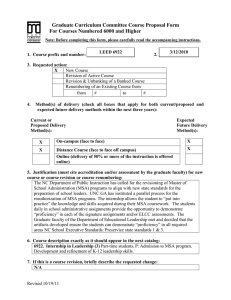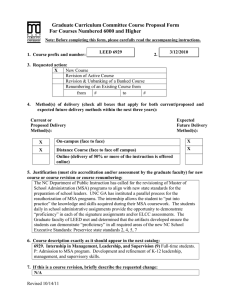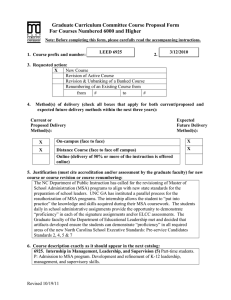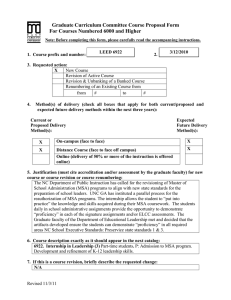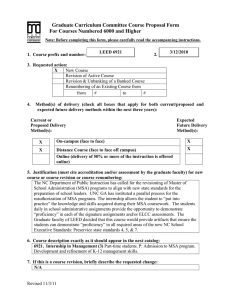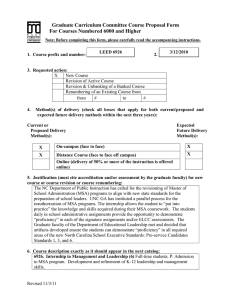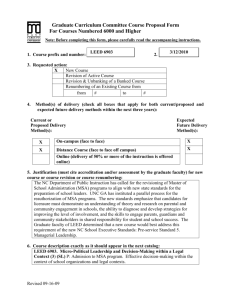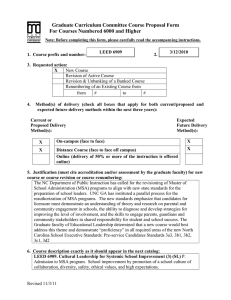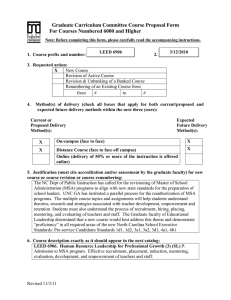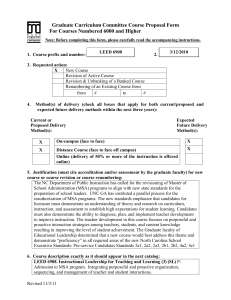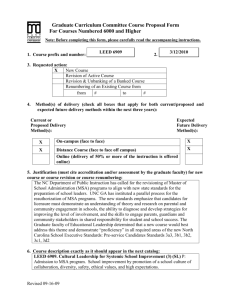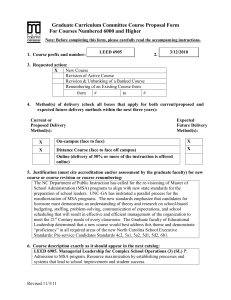6921
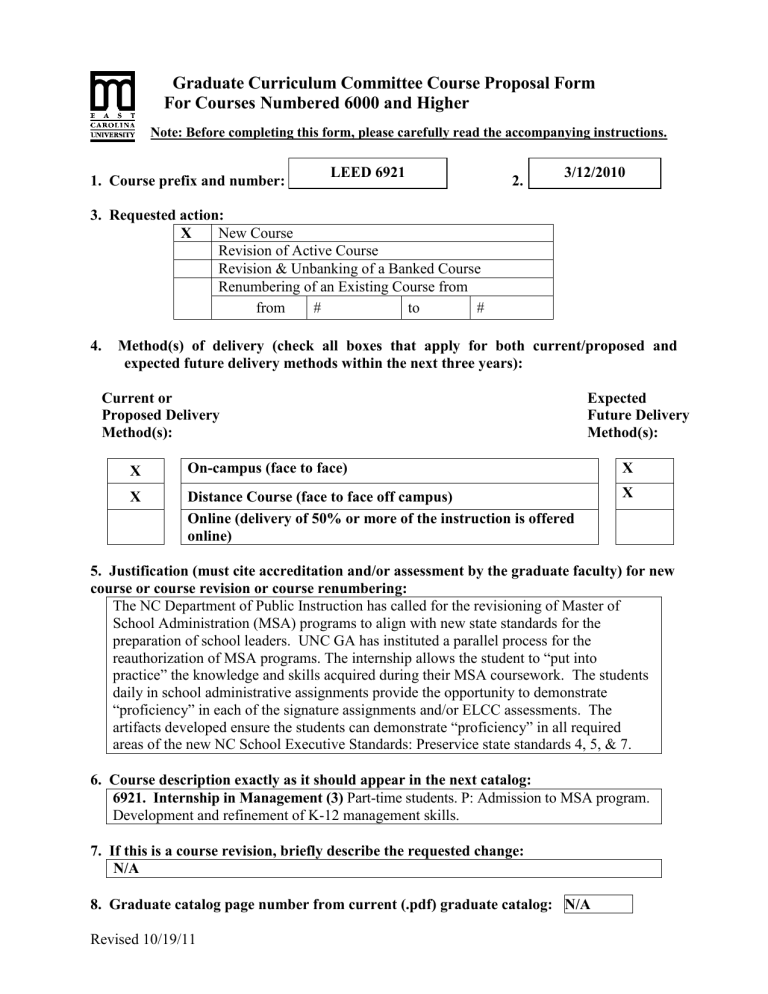
Graduate Curriculum Committee Course Proposal Form
For Courses Numbered 6000 and Higher
Note: Before completing this form, please carefully read the accompanying instructions.
LEED 6921
1. Course prefix and number:
3/12/2010
2. Date:
3. Requested action:
X New Course
Revision of Active Course
Revision & Unbanking of a Banked Course
Renumbering of an Existing Course from
from # to #
4. Method(s) of delivery (check all boxes that apply for both current/proposed and expected future delivery methods within the next three years):
Current or
Proposed Delivery
Method(s):
X
On-campus (face to face)
Expected
Future Delivery
Method(s):
X
X
Distance Course (face to face off campus) X
Online (delivery of 50% or more of the instruction is offered online)
5. Justification (must cite accreditation and/or assessment by the graduate faculty) for new course or course revision or course renumbering:
The NC Department of Public Instruction has called for the revisioning of Master of
School Administration (MSA) programs to align with new state standards for the preparation of school leaders. UNC GA has instituted a parallel process for the reauthorization of MSA programs. The internship allows the student to “put into practice” the knowledge and skills acquired during their MSA coursework. The students daily in school administrative assignments provide the opportunity to demonstrate
“proficiency” in each of the signature assignments and/or ELCC assessments. The artifacts developed ensure the students can demonstrate “proficiency” in all required areas of the new NC School Executive Standards: Preservice state standards 4, 5, & 7.
6. Course description exactly as it should appear in the next catalog:
6921. Internship in Management (3) Part-time students.
P: Admission to MSA program.
Development and refinement of K-12 management skills.
7. If this is a course revision, briefly describe the requested change:
N/A
8. Graduate catalog page number from current (.pdf) graduate catalog: N/A
Revised 10/19/11
9. Course credit:
Lecture Hours
Lab
Studio
Practicum
Internship
Weekly OR
Weekly OR
Weekly OR
Weekly OR
Per Term Credit Hours
Per Term Credit Hours
Per Term Credit Hours
Per Term Credit Hours
0
10 Weekly OR 140 Per Term Credit Hours 3
Other (e.g., independent study) Please explain. Seminar for 12 hours per term
0
Total Credit Hours 3
10. Anticipated annual student enrollment:
11. Affected degrees or academic programs:
90
Degree(s)/Program(s) Current Catalog Page Changes in Degree Hours s.h. s.h. s.h. s.h. s.h. s.h.
MSA/Educational Leadership 176 N/A
12. Overlapping or duplication with affected units or programs:
X Not applicable
Notification & response from affected units is attached
13. Council for Teacher Education (CTE) approval (for courses affecting teacher education):
Not applicable
X Applicable and CTE has given their approval.
14. Service-Learning Advisory Committee (SLAC) approval
X Not applicable
Applicable and SLAC has given their approval.
15.
Statements of support: a. Staff
X Current staff is adequate
Additional staff is needed (describe needs in the box below): b. Facilities
X Current facilities are adequate
Additional facilities are needed (describe needs in the box below): c. Library
X Initial library resources are adequate
Initial resources are needed (in the box below, give a brief explanation and an estimate for the cost of acquisition of required initial resources):
Revised 10/19/11
d. Unit computer resources
X Unit computer resources are adequate
Additional unit computer resources are needed (in the box below, give a brief explanation and an estimate for the cost of acquisition): e. ITCS resources
X ITCS resources are not needed
The following ITCS resources are needed (put a check beside each need):
Mainframe computer system
Statistical services
Network connections
Computer lab for students
Software
Approval from the Director of ITCS attached
16. Course information (see: Graduate Curriculum and Program Development Manual for instructions): a. Textbook(s) and/or readings: author(s), name, publication date, publisher, and city/state/country
MSA Internship Manual (developed by the LEED faculty) located at https://author.ecu.edu/cs-educ/leed/Current.cfm last updated May 2011 b. Course objectives for the course (student – centered, behavioral focus)
Apply leadership theory in practice:
Complete a variety of tasks assigned by the local school supervisor
Demonstrate reflective thinking in on-the-job activities.
Engage in regular reflection and dialogue about leadership practices with fellow interns and the university supervisor.
Demonstrate continuing growth in knowledge and skills related to each of the six standards of the Interstate School Leaders Licensure Consortium: vision, school culture and instruction, management, collaboration, ethics, and the legal and political context.
Demonstrate a “proficiency” level in each of the evidence areas specified by the NC State Board of Education: positive Impact on student learning and development, teacher empowerment and leadership, community involvement and engagement, organizational management, school culture and safety, and school improvement.
Demonstrate the ability to analyze and resolve school problems.
Demonstrate sensitivity to the diverse needs of students, faculty, and the community.
Demonstrate the ability to contribute to school improvement efforts as a member of the school leadership team.
Demonstrate the effective use of technology in school operations.
Revised 10/19/11
c. Course topic outline
NC School Executive Standards [NCSES]
Interstate School Leaders Licensure Consortium Standards[ISLLC]
Development of “artifacts” that demonstrate a “proficient” level in each of the
NCSES indicators.
Electronic portfolio development
Involvement in “assigned school” administrative duties
Monthly academic seminars that address: the standards, artifact development, information sharing, and the six N C State Board evidences [positive impact on student learning and development, teacher empowerment and leadership, community involvement and engagement, organizational management, school culture and safety, school improvement]
Development and/or refinement of artifact/s and action plans for evidence clusters dealing with:”Learning Centered Leadership Framework” ,”Teacher
Leadership Framework”, “Engagement Action Plan”, “School Management
Framework”, School Culture Framework”, and “School Improvement
Framework”.
d. List of course assignment, weighting of each assignment, and grading/evaluation system for determining a grade
COURSE ASSIGNMENTS
Class and Online Participation 25%
Assignments/journal 25%
Field Experience 50%
GRADING/EVALUATION SCALE
A= 90-100%
B= 80-89%
C= 70-79%
F= 0-69%
Revised 10/19/11
